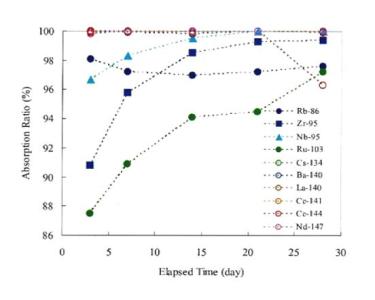Radioactive Waste Management
Associate Professor
- FUKUTANI, Satoshi e-mail: fukutani<atmark>
Assistant Professors
- SHIBAHARA, Yuji e-mail: y-shibahara<atmark>
* replace <atmark> with @rri.kyoto-u.ac.jp
Careful attention must be paid to manage radioactive waste because of its special property for radiological safety. Investigated topics on liquid waste treatment are as follows: dehydration/immobilization of high salt-content concentrate arising from evaporation treatment. Migration of radionuclides through soil has also been studied to evaluate its influence on the safety of waste disposal sites. Monitoring of radioactivity contamination from nuclear facilities has been performed for evaluating environmental impact. In addition, we have been analyzing various aspects of demerits of nuclear energy. Detailed research topics are as follows:
- 1) Measurement, decontamination and treatment of radioactive pollution from nuclear facilities
- Radionuclides including Cs-137 were released to the environment by nuclear facilities accidents. For decontamination and treatment of radioactive pollution, new types of sorption medium are been investigating.
- 2) Fundamental Research on Waste Disposal
- Radionuclides in waste materials were disposed of on land. They reach the food chain via surface and underground water, resulting in public risk and potential health hazard. Absorption tests with a multi-tracer produced at KUR is conducted for fundamental study of radionuclides migration in soil.
- 3) Risk Assessment of the Use of Nuclear Energy
- One of important issue in which our society is now involved is whether we depend on nuclear energy or not. In order to find a reasonable answer to this issue it is necessary to clarify merits and demerits accompanying the use of nuclear energy. We have been analyzing various aspects of the demerits including radiological consequences of the nuclear accidents.

Changes in adsorption ratio of multitracer with elapsed time




